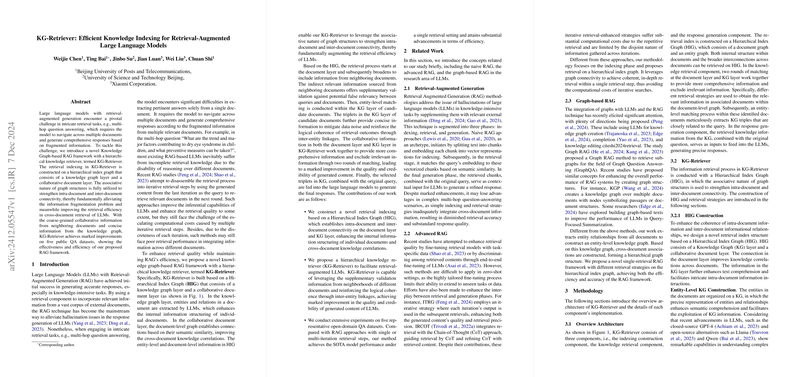Analyzing "KG-Retriever: Efficient Knowledge Indexing for Retrieval-Augmented LLMs"
In the presented paper, the authors address the challenges faced by LLMs with Retrieval-Augmented Generation (RAG) in complex retrieval tasks, such as multi-hop question answering. These tasks demand traversing multiple documents and synthesizing scattered information to form comprehensive answers, a process that often leads to challenges in both efficiency and accuracy. To counter these issues, the authors propose KG-Retriever, a novel RAG framework utilizing a hierarchical knowledge retriever.
Framework and Methodology
The KG-Retriever framework leverages a Hierarchical Index Graph (HIG) comprising two layers—a knowledge graph layer and a collaborative document layer. By integrating a hierarchical structure, KG-Retriever improves intra-document and inter-document connections. Intra-document connectivity is enhanced through a processed layer of knowledge graphs involving entities and relations extracted by LLMs from individual documents. Simultaneously, inter-document associations are facilitated through a collaborative document layer, improving cross-document knowledge coherence.
The retrieval process in KG-Retriever is designed to start at the document layer, incorporating neighboring documents identified based on their semantic similarity to reduce potential false relevancy. Thereafter, an entity-level matching is performed within the candidate documents’ knowledge graphs, emphasizing relevant triplets and refining retrieval results to enhance logical coherence and minimize noise.
The proposed framework addresses existing challenges in multi-hop question answering and similar intricate retrieval tasks by providing a more interconnected approach to information organization and retrieval. Practical implications of this work include the potential for enhanced efficiency and performance boosts in LLMs engaged in generating content across a variety of complex tasks, as evidenced by its tested efficacy on multiple QA datasets.
Experimental Evaluation and Results
Extensive experimentation conducted across five representative open-domain QA datasets reveals that KG-Retriever not only achieves superior performance over single and multi-iteration retrieval steps of existing baselines but also ensures significant efficiency improvements. This is particularly evident where KG-Retriever sets a new benchmark, surpassing state-of-the-art (SOTA) outputs within a single retrieval setting. Such empirical findings validate the theoretical expectations from leveraging a structured hierarchical graph for retrieval purposes.
Theoretical Implications and Future Directions
Theoretically, the introduction of a hierarchical retrieval setup enhances our understanding of how structured information models within LLMs can drastically improve retrieval effectiveness. It raises the prospect of dynamic indexing mechanisms to further streamline complex retrieval tasks within evolving and varied datasets, suggesting avenues for further research in dynamic and adaptable knowledge indexing frameworks.
To conclude, the KG-Retriever stands as a sophisticated enhancement to the field of LLM RAG strategies, providing vital insights and potentially setting a precedent for future developments in efficient, coherent, and contextually aware retrieval systems in artificial intelligence. The experiment results underscore its robust applicability and form a groundwork for pursuing more refined approaches to large-scale and dynamic information management within LLMs.
